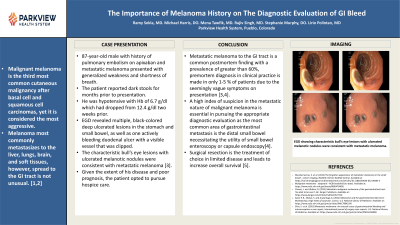Tuesday Poster Session
Category: GI Bleeding
P3503 - The Importance of Melanoma History on the Diagnostic Evaluation of GI Bleed
Tuesday, October 24, 2023
10:30 AM - 4:00 PM PT
Location: Exhibit Hall

Has Audio

Mena Tawfik, MD
Parkview Medical Center
Pueblo, CO
Presenting Author(s)
Ramy Sekla, MD, Michael Harris, DO, Mena Tawfik, MD, Rajiv Singh, MD, Stephanie Murphy, DO, Lirio Polintan, MD
Parkview Medical Center, Pueblo, CO
Introduction: Malignant melanoma is the third most common cutaneous malignancy after basal cell and squamous cell carcinomas, yet it is considered the most aggressive. Melanoma most commonly metastasizes to the liver, lungs, brain, and soft tissues, however, spread to the GI tract is not unusual.
Case Description/Methods: An 87-year-old male presented to the hospital with generalized weakness and shortness of breath. His past medical history includes a recent pulmonary embolism for which he is on anticoagulation with apixaban and aspirin as well as metastatic melanoma to the lungs, ribs, and spine. The patient reported dark stools for months prior to presentation. He was found to be hypotensive with Hb of 6.7 g/dl which had significantly dropped from 12.4 g/dl two weeks prior. He underwent resuscitation with IV fluids and was transfused one unit of blood. Esophagogastroduodenoscopy revealed multiple, black-colored deep ulcerated lesions in the stomach and small bowel, as well as one actively bleeding duodenal ulcer with a visible vessel that was clipped. The characteristic bull’s eye lesions with ulcerated melanotic nodules were consistent with metastatic melanoma. Given the extent of his disease and poor prognosis, the patient opted to pursue hospice care.
Discussion: Metastatic melanoma to the GI tract is a common postmortem finding with a prevalence of greater than 60%; however, premortem diagnosis in clinical practice is made in only 1-5 % of patients due to the seemingly vague symptoms on presentation. A high index of suspicion in the metastatic nature of malignant melanoma is essential in pursuing the appropriate diagnostic evaluation as the most common area of gastrointestinal metastasis is the distal small bowel necessitating the utility of small bowel enteroscopy or capsule endoscopy. Surgical resection is the treatment of choice in limited disease and leads to increase overall survival.
Disclosures:
Ramy Sekla, MD, Michael Harris, DO, Mena Tawfik, MD, Rajiv Singh, MD, Stephanie Murphy, DO, Lirio Polintan, MD. P3503 - The Importance of Melanoma History on the Diagnostic Evaluation of GI Bleed, ACG 2023 Annual Scientific Meeting Abstracts. Vancouver, BC, Canada: American College of Gastroenterology.
Parkview Medical Center, Pueblo, CO
Introduction: Malignant melanoma is the third most common cutaneous malignancy after basal cell and squamous cell carcinomas, yet it is considered the most aggressive. Melanoma most commonly metastasizes to the liver, lungs, brain, and soft tissues, however, spread to the GI tract is not unusual.
Case Description/Methods: An 87-year-old male presented to the hospital with generalized weakness and shortness of breath. His past medical history includes a recent pulmonary embolism for which he is on anticoagulation with apixaban and aspirin as well as metastatic melanoma to the lungs, ribs, and spine. The patient reported dark stools for months prior to presentation. He was found to be hypotensive with Hb of 6.7 g/dl which had significantly dropped from 12.4 g/dl two weeks prior. He underwent resuscitation with IV fluids and was transfused one unit of blood. Esophagogastroduodenoscopy revealed multiple, black-colored deep ulcerated lesions in the stomach and small bowel, as well as one actively bleeding duodenal ulcer with a visible vessel that was clipped. The characteristic bull’s eye lesions with ulcerated melanotic nodules were consistent with metastatic melanoma. Given the extent of his disease and poor prognosis, the patient opted to pursue hospice care.
Discussion: Metastatic melanoma to the GI tract is a common postmortem finding with a prevalence of greater than 60%; however, premortem diagnosis in clinical practice is made in only 1-5 % of patients due to the seemingly vague symptoms on presentation. A high index of suspicion in the metastatic nature of malignant melanoma is essential in pursuing the appropriate diagnostic evaluation as the most common area of gastrointestinal metastasis is the distal small bowel necessitating the utility of small bowel enteroscopy or capsule endoscopy. Surgical resection is the treatment of choice in limited disease and leads to increase overall survival.
Disclosures:
Ramy Sekla indicated no relevant financial relationships.
Michael Harris indicated no relevant financial relationships.
Mena Tawfik indicated no relevant financial relationships.
Rajiv Singh indicated no relevant financial relationships.
Stephanie Murphy indicated no relevant financial relationships.
Lirio Polintan indicated no relevant financial relationships.
Ramy Sekla, MD, Michael Harris, DO, Mena Tawfik, MD, Rajiv Singh, MD, Stephanie Murphy, DO, Lirio Polintan, MD. P3503 - The Importance of Melanoma History on the Diagnostic Evaluation of GI Bleed, ACG 2023 Annual Scientific Meeting Abstracts. Vancouver, BC, Canada: American College of Gastroenterology.
